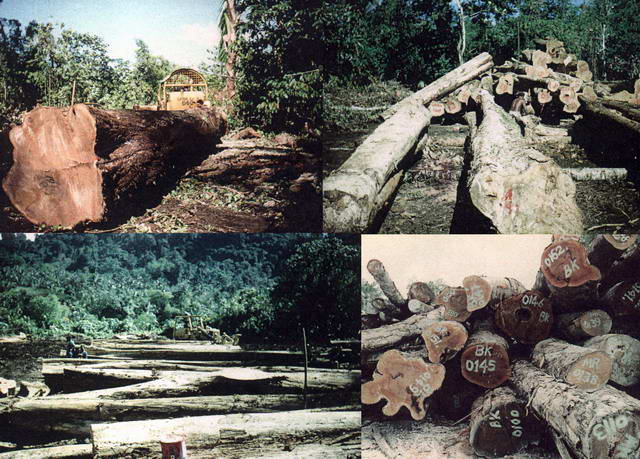
The following products are produced at great social and environmental cost to Borneo's forests and indigenous communities.
1. TROPICAL PLYWOOD
 Lauan, the generic term for tropical plywood, refers to wood from any of hundreds of Dipterocarp tree species. Found in home improvement centers and lumberyards, it is often cheaper and more readily available than domestic hardwood plywood. Lauan is commonly used in: facing for interior hollow-core doors; backing of shelving units, dressers, and drawers; sub-flooring and sub-roofing; and various small plywood needs in general construction. In Home Depot stores, lauan is often falsely labeled as Red Oak. In most other stores, it is labeled 'lauan', 'meranti', or simply as 'Made in Malaysia' or 'Made in Indonesia'.
Lauan, the generic term for tropical plywood, refers to wood from any of hundreds of Dipterocarp tree species. Found in home improvement centers and lumberyards, it is often cheaper and more readily available than domestic hardwood plywood. Lauan is commonly used in: facing for interior hollow-core doors; backing of shelving units, dressers, and drawers; sub-flooring and sub-roofing; and various small plywood needs in general construction. In Home Depot stores, lauan is often falsely labeled as Red Oak. In most other stores, it is labeled 'lauan', 'meranti', or simply as 'Made in Malaysia' or 'Made in Indonesia'.
Tropical plywood production has devastated the forests of Southeast Asia, resulting in 80% deforestation in Thailand and 90% in the Philippines. In Malaysian Borneo, over 50% of Sarawak and Sabah has been logged. Indonesia is the world's top producer of tropical plywood, holding approximately 90% of the global trade.
There are a growing amount of non-wood alternatives currently on the market. Visit Rainforestweb for details.
2. DOWELS
Dowels are almost always made of ramin, an endangered tree that grows in Borneo's peat (swamp) rainforests. Most tool handles - from rakes to brooms, mops, plungers and paintbrushes - are made of ramin dowels. A blond wood that at times is stained with a dark finish, ramin is widely used in furniture such as futon frames and garden furniture.
Indonesia is currently the world's largest producer of ramin dowels. Logging is driving this species, as well as the Bornean orangutan, to extinction. (Ramin is an essential part of orangutan habitat). Alternatives to ramin include products made with plastic handles or metal frames. Even if a ramin product has a 'Made in the USA' label, the wood is most likely imported from Borneo and assembled in the U.S.
3. RAYON
Rayon, made from wood pulp, is used to make clothing. Rayon mills are rapidly destroying native rainforests and coastal mangroves, and causing grave water and air pollution problems in many places.
4. PALM OIL
Malaysia and Indonesia are the world's top two producers of palm oil, and most global palm oil production comes from Borneo. Palm oil plantation development involves clear cutting native forests and has contributed to Borneo's frequent and devastating fires. Palm oil is an ingredient in many foods, although it is sometimes listed generically as 'vegetable oil'.5. TEAK, IRONWOOD, EBONY AND SANDALWOOD
 These valuable hardwoods from Borneo are disappearing rapidly. Each is valued for its special properties such as fragrance (sandalwood) or durability (ironwood species ulin or belian). It can take decades for these species to reach maturity. Community reforestation by Borneo Project partners is working to reestablish native trees in areas degraded by logging. Given the species' slow rate of growth, it will be some time before populations of these species recover.
These valuable hardwoods from Borneo are disappearing rapidly. Each is valued for its special properties such as fragrance (sandalwood) or durability (ironwood species ulin or belian). It can take decades for these species to reach maturity. Community reforestation by Borneo Project partners is working to reestablish native trees in areas degraded by logging. Given the species' slow rate of growth, it will be some time before populations of these species recover.6. PRIMATE PETS

Trade in exotic and endangered species is illegal and a violation of CITES, the Convention on International Trade in Endangered Species of Wild Fauna and Flora. Among common Borneo species traded as pets are the orangutan, the long-tailed macaque, and the pig-tailed macaque. On average, several animals die during capture or transit for each animal sold. Exotic species trade has also been linked to organized crime.
So people, please consider your purchases carefully and opt for alternatives whenever possible =D



No comments:
Post a Comment